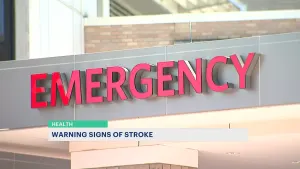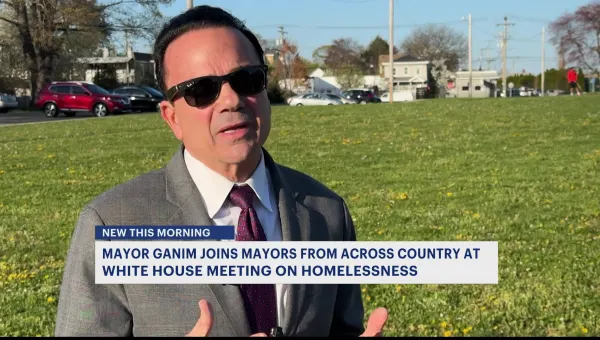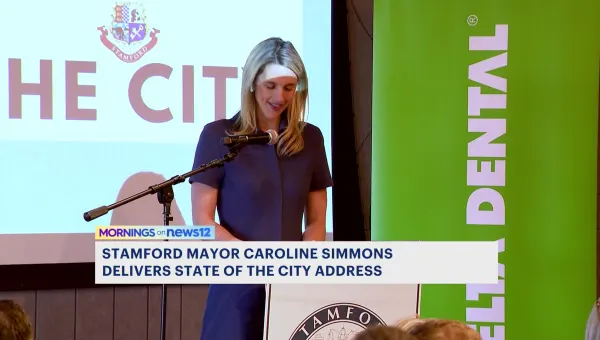CT House extends sick days to nearly all workers, now heads to Senate
Supporters said sick leave will make a huge difference for low-wage workers, but opponents called it another costly mandate on small businesses.
Share:
More Stories
0:34

Stamford FD: 67-year-old man found dead inside hoarder house following fire
1h ago1:56

Progress being made in demolishing I-95 overpass in Norwalk damaged by fire
1h ago0:32

Police: Contractor failed to complete project and refund Orange homeowners
2h ago0:22

Officials: 2-car crash in Orange hospitalizes 7
2h ago1:32

Knowing the early warning signs during Stroke Awareness Month
2h ago2:11

Mostly cloudy Saturday in Connecticut; widespread showers on Sunday
7h ago0:34

Stamford FD: 67-year-old man found dead inside hoarder house following fire
1h ago1:56

Progress being made in demolishing I-95 overpass in Norwalk damaged by fire
1h ago0:32

Police: Contractor failed to complete project and refund Orange homeowners
2h ago0:22

Officials: 2-car crash in Orange hospitalizes 7
2h ago1:32

Knowing the early warning signs during Stroke Awareness Month
2h ago2:11

Mostly cloudy Saturday in Connecticut; widespread showers on Sunday
7h agoThousands of workers are a big step closer to getting paid sick days. After an all-day debate, the Connecticut House of Representatives approved a controversial bill extending sick time to nearly all workers.
Supporters said sick leave will make a huge difference for low-wage workers, but opponents called it another costly mandate on small businesses.
“NOT FAIR TO US”
Since most companies in Connecticut aren’t required to offer paid sick days, many employees have to go to work – even when they’re sick. Otherwise, they won’t get paid.
“It is not fair for us, when we work many hours at a time, we feel a lot of pain in our body,” said housekeeper Patricia Brispo.
Currently, only businesses with more than 50 employees have to offer sick time. And even then, only “service workers” qualify – including cashiers, nurses, child care workers and hair stylists.
“We’re seeing about 1.6 million people left behind,” said state Rep. Manny Sanchez (D-New Britain). “Most people that are minimum wage workers, women, people of color – those are the folks that will be most affected.”
COSTLY AND COMPLICATED?
But Republicans said the mandate is too costly, and its’ accrual process is too complicated.
“This is going to be a problem for every small business,” said House GOP leader Vin Candelora (R-North Branford). “You are going to need an accountant to calculate every hour that accrues for each employee. It’s unworkable.”
Critics also slammed a provision letting workers take time off without a doctor’s note.
“This is not sick leave,” said state Rep. Steve Weir (R-Hebron), who founded a property restoration company. “This could be for someone to take a day off and go to the beach.”
Businesses who don’t comply could face penalties from the Connecticut Department of Labor.
COMPROMISES FOR SMALL BUSINESSES
In a compromise, majority Democrats decided to phase-in smaller employers over the next three years. Companies could also use vacation days to meet the sick time requirement, and seasonal employees – like amusement park and summer camp workers – would be exempt. Employees would have to be on the payroll for at least 120 days to use sick days.
“People deserve time off, and I think most employers provide that, so I just think this actually ends up covering a very small subset of persons -- mostly part-time people,” said House Speaker Matt Ritter (D-Hartford).
The legislation also sets up a task force to look into additional tax credits to help offset losses for smaller employers.
WHAT’S NEXT?
Lawmakers abandoned similar legislation last year, after labor advocates rejected a compromise exempting businesses with fewer than 11 employees.
This year’s bill now heads to the state Senate. It’s expected to pass because expanding paid sick time is a priority for Gov. Ned Lamont.
Governor Ned Lamont released the following statement regarding the vote on Wednesday:
“Our existing laws on paid sick days include important protections for some workers, however there are broad categories of workers who are left unprotected, and as a result those workers are sometimes faced with a difficult decision between either going to work sick – and possibly spreading illness – or sacrificing a day’s wage. The legislation approved by the House today strikes an appropriate balance between protecting our workforce while also enacting safeguards for small businesses to ensure that this right is not being misused. Especially considering what we learned during the recent outbreak of a viral pandemic, it’s appropriate that we take a look at our existing paid sick days laws and evaluate how they are working and how we can strengthen them. I applaud the House on their vote today and I encourage the Senate to approve it so that I can sign it into law.”
The legislation is House Bill 5005, An Act Expanding Paid Sick Days in the State. It will next be transmitted to the Senate for its consideration.





